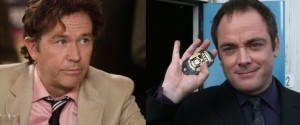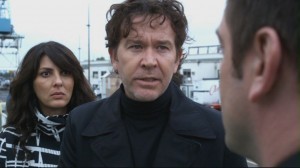Leverage Sunday: “The Three Strikes Job” and “The Maltese Falcon Job”
So let’s talk about competent protagonists.
The Leverage producers have a phrase they’re fond of: competence porn, the thrill viewers and readers get watching or reading about somebody who is really, really good at something. I prefer watching a protagonist become competent through the struggle with the antagonist, but I will not deny that I loved watching the five people who made up the Leverage team ply their skills from the beginning. They were all damn good at what they did, that’s why Victor chose them (except for Sophie; Nate chose Sophie). Some of my favorite Leverage moments are watching Parker leap off a building, Hardison hack the back of a hotel TV, Eliot facing four guys with baseball bats and saying, “This is hardly fair,” then seeing two more show up and saying, “Now it’s fair,” and kicking everybody’s ass. Sophie’s grifts are poetry; watching her hook Victor in the pilot is thing of a beauty. And then there’s Nate, the embodiment of Irene Adler’s “Smart is the new sexy,” quick-thinking, experienced, bold, smart, and powerful. It takes him an entire season to build his team of misfits into a family, and then he pulls off a miracle in the season finale and defeats the bad guy AND his nemesis Sterling. Nate is competence porn in the flesh.
So now what are you going to do with him?
One of the problems with an ace team is that they’re hard to defeat and that makes it tough to write story tension. The best stories have protagonists who are out-matched, out of their elements, on the run, and the Leverage team, ensconced in Nate’s apartment, eating breakfast at his table, having meetings downstairs in the bar, are never out of their element, even when they’re on the road. So to even the playing field, the writers focused on the rot from within: Nate’s a drunk. The first season finale is the team’s attempt to stage an intervention: help Nate bring down the man who let his son die, and Nate would come back healed.
It works to a certain degree: Nate sobers up. But he trades an addiction to booze for an addiction to power and vengeance, and season two is a little less fun because of that: Nate sober is mean as hell. Not only that, his thirst for vengeance on all the rich guys who prey on those beneath them means that he’s taking bigger and bigger risks and dragging the team with him. When he starts drinking the fourth episode from the end of the season, it’s the worst of both worlds: he’s drunk AND driven by his demons, which is how they end up in the mess with mayor of Bellbrook, MA, and a vicious arms dealer (Richard Kind and Paul Blackthorne, two of my favorite actors ever).
So the competent protagonist gives you a paradox of a problem:
How are you going to defeat him if he’s so damn good at what he does?
If he’s not that damn good at what he does, how are you going to portray him as competent?
This is one of the many reasons I like an incompetent protagonist who storms through her plot picking up skills and confidence and becomes competence porn: That’s an easy protagonist to write. But those protagonists pretty much work for one story, or if you’re on TV, one season because the payoff is the competence, that’s the reward at the climax. If you’re going to go on to a second book in a series, a second season, you’ve got a competence porn problem, how to deliver and still arc character.
Which is what “The Three Strikes Job” and “The Maltese Falcon Job” are all about. Throughout the season, as Nate takes bigger chances and ignores his growing problems, the three younger members start to bond together and Sophie leaves. Then at the beginning of “Three Strikes,” Nate gets hit with a triple: his friend in the state police, Bonanno, is gunned down; the hospital where he fights for his life brings back all the despair of his son’s death, and he can’t reach Sophie when he needs her desperately. When he goes to meet the team to look into the attack, he loses it and screams at them, and there’s a clear moment when they all realize he’s losing his mind. Hardison pulls him back by giving him the detective problem of finding out who shot Bonnano, but that moment in the beginning haunts the rest of the episode, driving it to the point at the end (the midpoint of the two-parter finale) where they’re trapped, their safe house blown, and on the run. Nate pulls them together at the beginning, but for the first time he has a team that’s actively angry with him and more than willing to tell him they don’t trust him. When even Parker tells him to shape up and “be the man we came back for,” he makes an even more audacious plan, a plan that would have worked except for one thing.
Sterling.
Any Leverage episode with Sterling in it is fun because he and Nate are doppelgängers, so evenly matched that at the end of every confrontation they always both win. But this time, Sterling has Nate, trapping him when he goes back to his apartment for his son’s drawing (Sterling, you bastard). Nate still tries to work the angles as Sterling looks at him with real sorrow for how far he’s fallen, accepting defeat only when Sterling tells him he can’t finish the con unless he becomes a witness, in return for which, Sterling will let him go free. Defeated, Nate says, “And my team goes free, too,” and Sterling says, “No. Just you.”
That’s one of those moments when you realize that Sterling doesn’t understand Nate at all. Yes, he’s a control freak, and yes, he’s a drunk, and yes, his reckless thirst for revenge against white collar predators has brought them all down, but the idea that he would betray three people who have become not just his team but his children . . . Sterling, what were you thinking?
Nate gets back on his feet, plays the FBI against Sterling’s Interpol, and both of them against the mayor and the gunrunners, and even so, he’s about to get shot when Sophie walks in, saves his ass, and gives them an escape route by bringing in a helicopter. When Sophie saves somebody, she saves somebody.
But Nate’s made a deal with Sterling and he’s going to keep it in his own way. As the helicopter touches down, Nate handcuffs himself to the railing and tells Sterling there’s a new deal: he’ll testify but only if his team goes free. Sterling’s stuck with it, especially since Nate’s been shot and is bleeding out on the pavement, but he’s not happy and neither is the team, stuck with a deal he made without them. Their rage is channeled into Sophie, who stoops to talk to Nate and gets kissed the way he’s wanted to kiss her for two seasons, only to get slapped hard, not for the kiss but for not bringing the team into the loop to make a plan to get them all out, no sacrifices. Nate’s won (and so has Sterling), but once again his team isn’t together and now he’s going to jail. The real victory comes in the last seconds when an FBI agent says, “Who are you?” and Nate says, “I’m Nate Ford. And I’m a thief,” taking a big step forward by accepting that he’s a different man than he’d planned to be.
From a writer’s point of view, this is great, great stuff. From a viewer’s point of view, it’s hard to watch because Nate is such a terrific character, and this season really breaks him down, destroys him so he can rise again, reborn, his internal conflict finally resolved.
The first episode back in the third season finds Nate in jail, competent as all hell again, so the writers will give him a new vulnerability, the threat of imprisonment in a foreign jail unless he brings down powerful master criminal, made worse by a team whose trust he has to win back. The fourth season will match the team against a billionaire CEO who is manipulating them to make money, always within the law. The fifth season they take on their greatest antagonist, after which Nate and Sophie retire because once you’ve taken on several major governments at once, there’s really no place else to go.
This second season was the grimmest of all because Nate’s real antagonist was himself, his tortured internal conflict between his illusion of being the omnipotent good guy and his denied reality of just being a very smart thief. It was a conflict that damaged his family and almost killed him–he’s bleeding out at the end of last episode–but in the end he’s still Nate Ford, not only a thief but the definition of competence porn.
Next week: “The Inside Job” and integrating back story.






